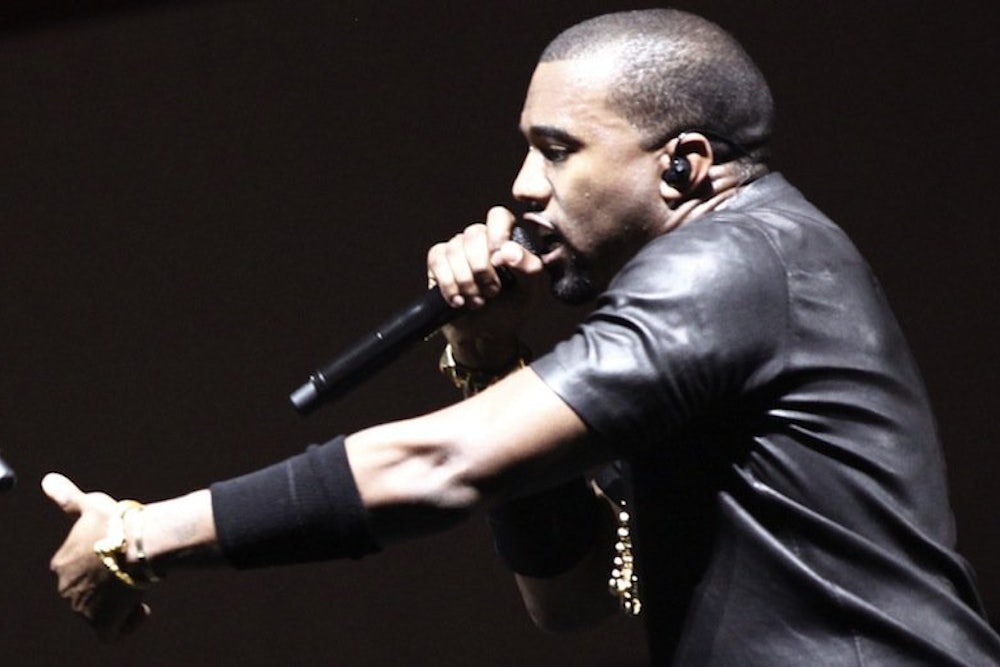At a 2011 tour stop in Chicago to promote their joint album Watch the Throne, Jay-Z and Kanye West played distinct hip-hop megastars: West, the protégé of Jay-Z (né Shawn Carter), preened to the crowd from both ends of the arena; Carter mostly remained fixed in one spot with the bill of his cap pulled low, his clipped gesticulations marking his orderliness. Watch the Throne was an album that presented two maximalist figures: an emotionally-conflicted artist and a business mogul.
In the years since, West and Carter, two of the biggest names in a genre that’s quickly becoming pop music’s center of gravity, have once again diverged. West’s recent release, Yeezus, is an efficient and abrasive ode to rap’s new electronic bent, while Carter’s Magna Carta Holy Grail is a compilation of songs that fails to capture the coherence of West’s most recent work. Magna Carta presents a Jay-Z that’s disconnected from the trends in hip-hop that West is helping to pioneer, an icon unsure of exactly where and how to fit in.
Yeezus is polarizing, but it’s consistent: a modern vision of hip-hop as a home to moody, bass-driven songs. Magna Carta, in contrast, attaches Jay-Z to the evolving landscape of hip hop, but it fails to connect him in a logical way. Magna Carta sounds, in part, like an effort to see if Jay-Z can match the trendiness and brash self-contradiction of his former protégé.
There is an attempt to enforce Yeezus’s electronic aggression in Magna Carta: Carter and Rick Ross sneer over twisting guitar chords and thick bass thumps on “FuckWithMeYouKnowIGotIt,” and Carter delivers a rambling Kanye-esque treatise on religion with “Heaven.” Yet in the latter song, he neglects the depth of his subject with a somewhat veiled, ambling hook and a snaking bass line. As New York Times pop music critic Jon Caramanica noted in his review of Watch the Throne, Jay-Z is prone to “an old-guard way of addressing new times.” This is Jay-Z wanting Kanye’s aesthetic but not committing, trading greater album structure for risk and sounding ambivalent all along.
Magna Carta’s production governs the music, not the lyricism—a new mode for Carter, who used to dominate his beats with his words. On Magna Carta, he becomes tethered to the kitschy stylisms of Timbaland, the producer who designed 11 of the 16 songs. The beats are undeniably memorable, even if they don’t seem well-equipped for Jay-Z’s cynicism: “Tom Ford” uses springy synths and echoing drums, “F.U.T.W.” spooky xylophone-like harmonies, and “Picasso Baby” grunge-like guitar notes. These songs show the 43-year-old Jay-Z trying to navigate Timbaland’s imaginative framework but failing to establish the command of past albums like The Blueprint, which understood that a minimalism of more restrained beats and brags works best for Carter.
Timbaland, as seen on Justin Timberlake’s recent album—the uneventful 20/20 Experience—enjoys the soaring tones of melodrama, and Jay-Z seems all-too-ready to oblige. There are exhausting attempts on Magna Carta to make this more protracted-sounding kind of music: The tacky album opener, “Holy Grail,” is a dislocated anthem, an isolated attempt to offer anodyne grandiosity. Beyoncé, the even more famous wife of Jay-Z, contributes to what is maybe Magna Carta’s least memorable and most tiring song, “Part II (On the Run),” which, following Watch the Throne’s “Lift Off,” is more evidence that Carter hasn’t quite figured out how to make music with her. The bright young vocalist Frank Ocean lands on a song almost as undistinguished: The eponymous “Oceans” is so flat that the use of a triangle is one of its more riveting features.
The best, or at least most intriguing, material on Magna Carta sounds unfinished, out of place, or too scattered. “BBC” features a cast of musicians, including the rapper Nas, but the sunny production makes it feel like an interlude more suited to a high-school prom. The short “Beach is Better” is produced by Mike Will Made It—the man responsible for a number of recent hip-hop radio hits—but it is too short to let the producer develop his typical nuance. “Somewhere in America” is produced by Hit-Boy, another rising figure, but it seems more like an attempt to show that Jay-Z is in tune with what’s hot rather than an attempt at making a well-structured track. By the end, the song comes off as oddly paranoid: “Feds still lurking, they see I’m still putting work in.” The gutsiest song on Magna Carta is “Crown,” a model of what Jay-Z can do if he invests in the bolder production methods evident on Yeezus. The song is made by the phenom Travis Scott, a Texan rapper who oversaw the production on Yeezus. The tone on “Crown” is distinctly Scott’s (see his spooky and beautiful debut EP Owl Pharaoh) and deeply introspective: Carter uses the strength of his cadence and the precision of Scott’s synths to expound the merit of desperation.
Carter pursued a populist tone in early advertisements for Magna Carta: A Samsung ad quoted him as saying, “Even the smallest person can have their voice be heard by millions.” This is the pleaser who’s still “frustratingly self-controlled,” as Zadie Smith wrote in a 2012 profile. The medium for this message also reveals quite a bit about Jay-Z’s current M.O.: Since his pseudo-retirement in 2003, Jay-Z has preferred corporate releases to fan-driven hype. Kingdom Come came on the heels of a Budweiser promotional contract in 2006; Magna Carta was first brought to everyone’s attention in a television ad during the NBA finals and was released last week on Samsung mobile devices. Magna Carta is, in the end, a result of that disposition—a sanitized effort that won’t offend but won’t make much of a mark, and one with distinct commercial overtones. Kanye seems less interested in this corporate of an approach, and that might be just the trick: Yeezus, for all its coarseness, is more groundbreaking than Magna Carta ever tries to be.
Noah Weiland is an intern at The New Republic.
